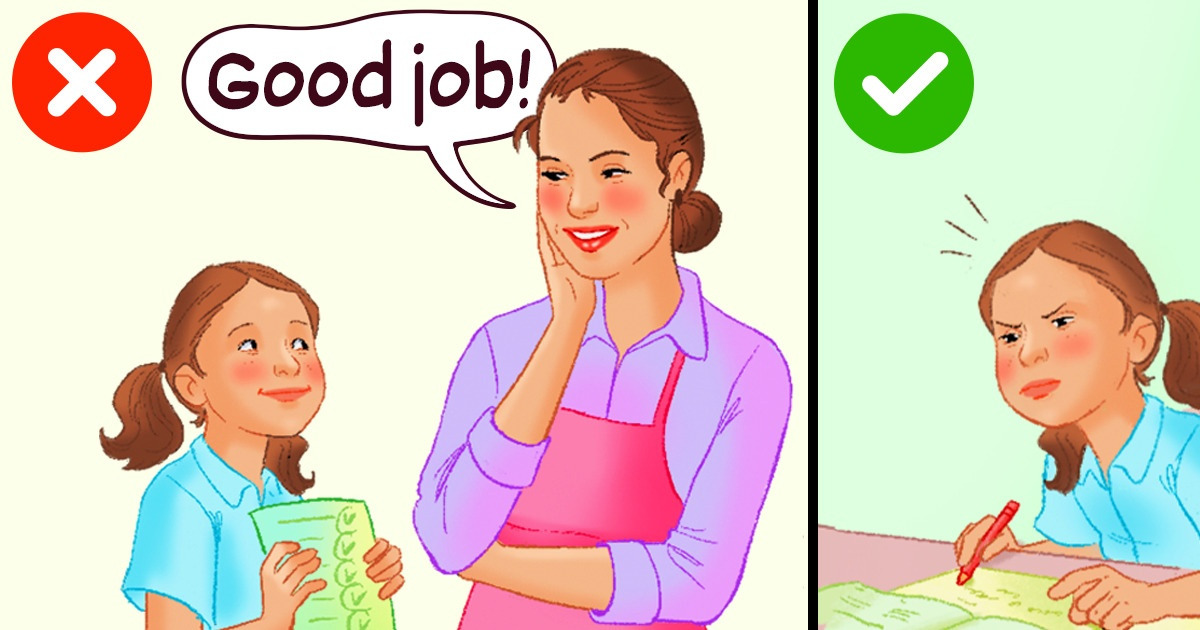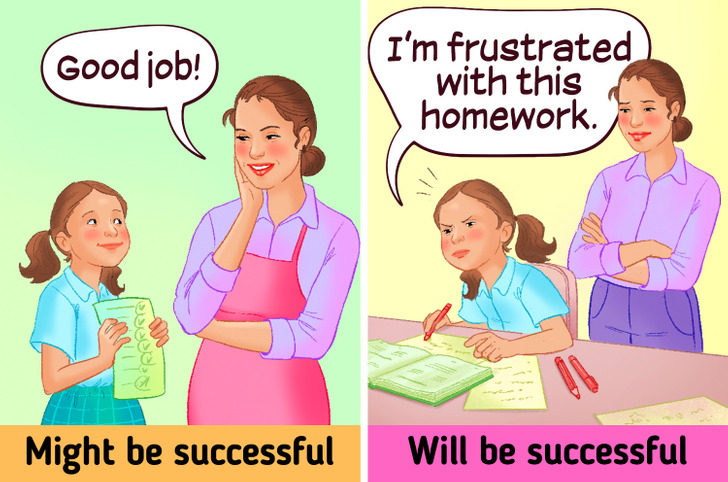21 Tweets That Can Wake Up Your Curiosity


Many parents focus primarily on the success of their children at school. They load kids with high expectations and try to control their lives at every turn. But in reality, we should be teaching them how to be better at navigating relationships, building communication, boosting their own confidence, and developing critical thinking instead.
We at Bright Side have found some safe, practical tips to become a better parent and help your kid grow into a skilled adult who is ready to embrace this diverse wonderful world.

Unfortunately, we cannot use praise like, You’re so smart! Great job! every time. Simply because there are ups and downs in life and we as parents need to prepare our children to be strong and ready to face anything in the future. Just imagine that your children come home from school with an A on their test. And then the next week they come home with D. What would you do?
Instead of using the same praise, it’s better to learn how to praise their effort. In this way, you will help your children learn more about themselves, learn about the situation, and figure out what they might do differently the next time. They will find out what is important to them, spend less time asking the outside world to evaluate their work, and create a satisfying and meaningful adult life.
Sometimes it’s hard to express our emotions, but we learn to do it through so-called emotional vocabulary. Pick some easy-to-understand situations and try to help your children recognize other people’s emotions and embrace them.
To do that, name emotions in a context intentionally, like saying: “You look happy!” or upset, and so on. Keep asking questions about your child’s state, like: “How did that make you feel?” or “That thing scared you, didn’t it?” The key here is to help your little one realize that all their feelings are entirely normal, and it’s okay to feel the whole spectrum of different emotions from time to time.
Share your own feelings continuously, so your kids feel safe expressing their feelings when necessary. Keep pointing out other people’s faces and studying their body language, asking: “How do you think that woman feels?”, “Have you ever felt anything like that?”
These easy exercises will help your kids feel more connected to others. One day, they will become emotionally intelligent adults who will get along with others easily and, in general, will be more thoughtful and understanding.
There are many techniques that help develop self-control in children. One of the most popular is the reward — or delayed reward — technique.
A study showed that kids who were able to wait patiently to receive bigger rewards were more successful in the future than their more impatient peers. To use this principle, just ask your kids to wait a bit or to behave properly in order to get a gift or candy — anything that is of great value to them.
Another method is making When-Then plans. This follows the basic principle when X happens, then you will do Y. And this can cover many situations, from brushing their teeth and waking up at a certain time to feeling bad or frustrated.
For instance, when somebody at school upsets them then they could count to 10, cool off, and go tell somebody about it instead of getting physical or quarreling. Over time, this will become an effortless habit.
Challenging your kids to show them unique and unusual ways to solve problems is also an essential skill for their future. Young children are generally very curious and passionate about learning new things. So getting them interested may be easy.
Here are a few tips to help your kids explore this wonderful world. For instance, instead of asking “yes” and “no” questions or giving an answer, motivate your children to think about a solution. Encourage them to develop their own ideas by asking, “What do you think will happen if we do...?” or “Guess what will happen next!”
Of course, kids can have many questions you don’t know the answers to. But instead of saying something like, “That’s just the way it is,” honestly admit that you don’t know the answer and encourage your child to find it with you. Then, go to the library together or search online. It will create a desire to learn in your child, and it could help them explore challenging or controversial topics in the future.
Perseverance helps kids carry on when it seems like the easiest thing to do is just give up. There are also many ways to achieve this essential trait. First, start with a small, simple task and help your child enjoy the success of every little step forward. For example, start by having them read 5 pages of a book and then ask them to tell you what they were about.
The expectations should also be small at first. As they grow up, children will face a long path full of discoveries, failures, and successes, so there’s no need to rush and try to accomplish as much as possible. Perhaps your child won’t be able to read those 5 pages in one evening, and that’s okay. Encourage them to get closer to the goal next time. When they finally achieve it, praise your kid and move on to the next milestone: 10 pages, then 15, and so on.
After a while, show your kids how much they have improved. For instance, if you tried helping them improve their handwriting, keep the first sample and track how long it all takes. Then, when the right moment comes, show them the changes. Seeing their hard work start to pay off will give them an extra boost to keep going and work even harder.
Also, we learn a lot by helping others. So you could try volunteering at a shelter, collecting goods for a food bank, or similar activities. This will show your kids how important it is to put in some effort and accomplish their tasks. Showing them the positive impact of everything they do for others will serve as one more encouraging factor.
Optimistic kids see challenges as temporary obstacles and are able to overcome them easily. The problem is that some kids are naturally more optimistic, while others find it really hard to see the bright side of things.
But teaching children begins with us. We are the ones who can encourage different ways of thinking in our kids. So it’s best to start by questioning ourselves about whether we’re generally more of a pessimist or an optimist. Do you usually describe things in a positive or negative way? Would your family and friends say the same about you?
One of the most important things when raising optimistic children is to help them solve their problems. For instance, if they play a sport and want to move up to the next level, discuss exactly what they have to do to achieve their goal. Offering your support through all the practices and lessons will make them believe they always have somebody to rely on no matter what.
If your children face difficulties, be an example to them. But always be honest. Say you also had a hard time with math when you were in school, but then you realized you could do it, started to work hard, and succeeded. And even if your children get a bad grade, just remind them that they’ve done well in the past, so you’re pretty sure they will be able to get a good grade again in the future.
What advice do you use in raising your child? What do they do that makes you proud? Please share your stories with us in the comments below.











